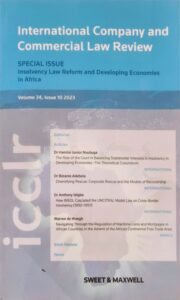 In September 2023, the International Company and Commercial Law Review published a special on Insolvency Law Reform and Developing Economies in Africa, which showcases some of the research that has been presented under the aegis of the Spotlight on Corporate Governance and Insolvency Law in Africa. The Spotlight series is one of the projects of the Commercial Law Research Network Nigeria (CLRNN). It invites investigations into the historical, theoretical, procedural, and practical elements of insolvency law and practice across Africa and provides insights into the context within which insolvency law is designed and practised. More broadly, it seeks to situate the African context within the global debate on insolvency law design. The results not only highlight insights from which African countries can draw inspiration, they illuminate the contributions that African countries make or can make to the design of the transnational insolvency order that impacts them.
In September 2023, the International Company and Commercial Law Review published a special on Insolvency Law Reform and Developing Economies in Africa, which showcases some of the research that has been presented under the aegis of the Spotlight on Corporate Governance and Insolvency Law in Africa. The Spotlight series is one of the projects of the Commercial Law Research Network Nigeria (CLRNN). It invites investigations into the historical, theoretical, procedural, and practical elements of insolvency law and practice across Africa and provides insights into the context within which insolvency law is designed and practised. More broadly, it seeks to situate the African context within the global debate on insolvency law design. The results not only highlight insights from which African countries can draw inspiration, they illuminate the contributions that African countries make or can make to the design of the transnational insolvency order that impacts them.
Thus, the articles that comprise the special issue examine topical issues of national and transnational concern including the design of rescue models and their impact on stakeholders; the role of the court in balancing stakeholder interests; the importance of reconsidering the insolvency implications of maritime security interests in African countries in light of the African Continental Free Trade Agreement (AfCFTA); and the influence of transnational non-governmental actors in institutionalising the UNCITRAL Model Law on Cross-border Insolvency Law. The balance of opinions encourages African states to engage with norm-setting at the national, regional, and transnational levels. They charge African countries to recognize and engage with the ideas that inform the transnational systems that constrain the design of their national insolvency laws. Collectively, the articles demonstrate the role that African countries can and must play in the design of viable insolvency systems.
Bolanle Adebola’s article is written in the context of the decision by three African countries, Ghana, Nigeria, and Uganda to retain an unmodified receivership procedure in their legal systems, to which they have added administration as an alternative procedure for the rescue of financially distressed entity. The paper examines the nature of both receivership and administration. It focuses particularly on the challenges of the receivership procedure with a view to determining whether it offers a superior rescue option to administration. This resurrects a debate that took place in the lead up to the introduction of the UK reforms in 2003, which restricted the use of receivership and promoted administration in its place. Thus, the paper asks whether the right decision was made at the time in the UK and more recently across the African countries mentioned. To address this question, the paper provides novel insights into the models of receivership that exist in Africa. Contrary to the popular belief that all African countries that received the British model have maintained that model, the paper demonstrates that there are, in fact, different models of receivership in Africa. These under-explored models of receivership can be critiqued to provide insights into the question whether receivership can be adequately modified to overcome its challenges. Also, whether any model of receivership offers a superior rescue procedure to administration. The insights offered help us to determine whether the African countries have made the right choice by maintaining receivership, or the decision to restrict its use, as done in the UK is preferable. Further, they also insights for any common law country evaluating the utility of both procedures. Those maintaining the use of receivership can modify it in line with the model from the African countries, with the modifications suggested in the paper to mitigate its most harmful elements.
Hamiisi Nsubuga’s article analyses the role of the court in balancing stakeholder interests on insolvency. He notes that national legal systems have provisions that empower courts, especially commercial courts, to regulate matters related to business and commercial affairs, and to make strategic decisions affecting companies facing financial difficulties. Nevertheless, the paper argues that the role of the court is often either misunderstood or underestimated due to divergent theoretical perspectives on the role that it ought to play in an insolvency setting. Accordingly, Nsubuga analyses the theoretical contentions on the role of the court in insolvency proceedings between two leading theoretical perspectives of insolvency law, namely the traditionalist and proceduralist perspectives. The proceduralists maintain that the role of the court is that of a disinterested arbiter. By this, they mean that the role of the court’s is limited to controlling the conflicting interests of the parties and allowing creditors to make their own decisions and influence the outcome they seek. On the other hand, the traditionalists hold the position that the court should play a key role in insolvency proceedings, especially on aspects of statutory interpretation and application of the law to facts presented by competing parties. A dearth of specialist insolvency/ bankruptcy judges in developing economies, as opposed to developed economies, such as the UK, United States of America (US), and the European Union (EU) to deal specifically with insolvency/bankruptcy issues, places the role of the court as central, in balancing stakeholder interests as advocated by the traditionalists. This is to ensure that issues, such as heavy reliance on insolvency practitioners in driving the insolvency process, the potential imposition of restructuring plans on dissenting/minority creditors, unfair application of mechanisms, such as creditor cross-class cramdown do not create a degree of imbalance on creditor protection in insolvency.
Warren De Waegh examines the design of national insolvency systems as Africa gets ready for more integrated regional trade. Highly relevant for this purpose is the framework of maritime security interests, including maritime liens and ship mortgages, which are vital for the financing and operation of the shipping industry. These instruments also determine the order of payment where the shipping company becomes insolvent, with security holders benefiting from a priority status which may see them get paid while other creditors are left empty-handed. Across the globe, there are differences in the categories of claims that are accorded security status, as well as the priority rankings accorded to the different security interests. The choice of protected maritime claims typically found in African countries is rooted in colonial history. Most of these laws have not been modified since independence. One exception is Egypt, which has a regime that suits its position as a highly profitable transit route between Europe and Asia due to the Suez Canal. The article thus invites African countries to redesign their maritime security frameworks to fit their domestic realities. This requires protecting vulnerable maritime creditors without jeopardising the provision of loans necessary for the financing of shipping. The article presents two general guidelines. First, that African States should consider extensive maritime lien protection, which suits the current African socio-economic maritime context. Second, that regional harmonisation of domestic maritime security frameworks should be introduced to facilitate intra-African maritime trade. Even after designing more effective frameworks, African countries must consider the effects of the transnational order on the categories of national interest. Thus, the article examines the effects of cross-border insolvency on domestic maritime and invites African countries looking to entrench the Model Law on Cross Border Insolvency (MLCBI) to take advantage of the liberty afforded to amend or modify provisions to better suit their contexts.
Anthony Idigbe’s article examines how the norms created at the transnational level become institutionalized such that nation states comply even in the absence of a central political power to oversee enforcement. This brings to the fore the role of international actors in generating and institutionalising norms. Within the insolvency context, the International Association of Restructuring, Insolvency and Bankruptcy Professionals (INSOL) has been instrumental to the creation of the transnational order that emerged in response to increased global trade. Its influence contributed to the development and adoption of the Model Law on Cross Border Insolvency (MLCBI), while its preferred norms of limited cooperation and coordination inform the principles of the MLCBI. The article deploys the stages of the norm life cycle theory, as an instrument of analyses to understand how the norms of cooperation and coordination cascaded through the efforts of INSOL, the norm entrepreneur. It notes that norm cascade is the second of the three stages of the norm life cycle and when a norm cascades, it is institutionalised. Thus, the article essentially examines how the norms of limited cooperation and coordination came to be institutionalised in the transnational insolvency order. The article notes, however, that successful norm emergence and cascade, the first two stages of the norm life cycle, may not necessarily result in widespread internalisation, which is the final stage. This is particularly so in the case of insolvency law where the adoption rate of the MLCBI amongst countries with high GDP (gross domestic product) is juxtaposed to that of their counterparts with low GDP. Thus, like the other articles, it raises the question of the intersection of nation-states and the transnational insolvency order.
Over the next four weeks, CLRNN will showcase each paper from the special edition. This introduction derives from the editorial written by Dr Bolanle Adebola, Associate Professor, University of Reading and Dr Hamiisi Junior Nsubuga and is available at International Company and Commercial Law Review I.C.C.L.R: [2023] 34(10), 553-558.
CLRNN Spotlight on Corporate Governance and Insolvency Law in Africa warmly invites interested persons and contributors to contact us via info@clrnn.net.

